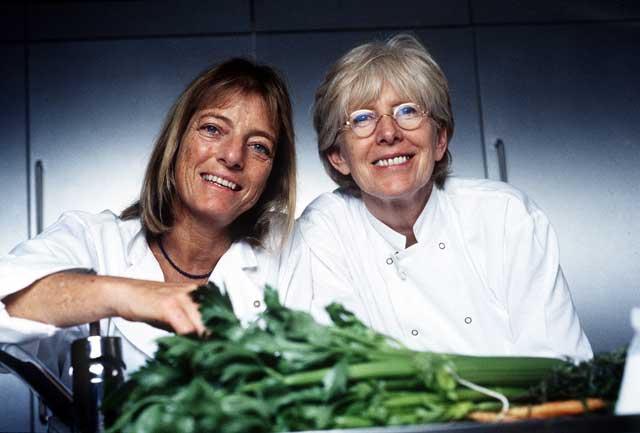Best food books for Christmas

The bad news is that several cookbooks have made the jump to £30. Even worse news is that these big-ticket items include the year's most desirable titles. You could eat sublimely for a year using only Nigel Slater's Tender (Fourth Estate, £30). The king of comfort eating has discovered the vegetable patch and seems as adept there as in the kitchen. However, we can all enjoy his succulent prose, wise advice ("celeriac is one root that makes a sloppy mash and needs an equal amount of potato if it is to stand in a cloudlike mound") and sure ingenuity with 400 home-grown dishes ranging from an asparagus, broad bean and mint pilaf to lamb shanks with preserved lemon and swede.
With a more restrained design, Rose Gray and Ruth Rogers have produced their best book yet in The River Café Classic Italian Cook Book (Michael Joseph, £30). I found myself instantly impelled to the kitchen by lucid and authentic recipes. Their insalata di polpo (boiled octopus with potatoes) was a tasty triumph, by far my best rendition of the tricky cephalopod. Schiacciata, a sweet grape-laden focaccia from Tuscany, was equally successful despite my inability to locate the sangiovese grapes in the illustration. I've made it successfully three times with black table grapes and once, less happily, in an experiment with blueberries.
Did you know that limpets are best after "three drinks of the March water" (late winter rain)? This is good to know but most of Darina Allen's Forgotten Skills of Cooking (Kyle Cathie, £30) is devoted to less recondite topics. With 44 pages on dairy cooking (including three pages on how to make butter) and 42 pages on the pig, this is an encyclopaedic guide to the cooking of Ireland that also finds room for blow-ins like panzanella (Tuscan bread salad) and the Indian pudding srikhand. If Allen were based in Britain instead of Co Cork, she would be one of our best-known cooks.
Even these pricy tomes seem modest compared to Larousse Gastronomique (Hamlyn, £60). Like a great aunt discovering Lady Gaga, this latest 1,200-page edition of the French food encyclopaedia has found room for revolutionaries like Heston Blumenthal and Thomas Keller. Whether this is worthwhile is debatable, since the Keller entry fails to mention his devotion to sous-vide cooking. Larousse also misses an entry on this vac-pack method. Where it really scores is in France's gastronomic heartland: omelette gets 2 pages and lobster four. It is the greatest book on the world's greatest cuisine.
The scarcely credible non-knead bread technique developed by Jim Lahey of New York's Sullivan Street Bakery spread like wildfire among foodies. A video on the New York Times website shows Lahey mixing flour, salt, yeast and water for 30 seconds. This is baked in a pre-heated cast-iron casserole (an oven within an oven) for an hour. The result is a perfect crusty country loaf, but as Lahey's My Bread (Norton, £19.99) explains, there are a few provisos to this miracle. You have to let the dough ferment for at least 12 hours and, if you're using a Le Creuset pan, unscrew the handle or it will disintegrate. For patient types, this book ranges from ciabatta to pizza, with sections on sandwiches and how to use stale bread (panzanella again).
In their introduction to Game: A Cookbook (Absolute, £25), Trish Hilferty and Tom Norrington-Davies ponder the British reluctance to make the most of this "incredibly cheap" food source. The main reason is a word that "attracts and repels people in equal measure – 'gamy'." From partridge pie to wild boar and bean casserole, rabbit rillettes to pheasant tagine, this is a persuasive argument against such prejudice. They stress simple roasts "because we really want you to appreciate that natural flavour of game", but will they persuade the British to enjoy flavour?
Even more perplexing is the British wariness concerning any fish that isn't battered. CJ Jackson, doyenne of the Billingsgate Seafood Training School, has devoted her career to eroding this baffling antipathy. Her Billingsgate Market Cookbook (New Holland, £20) is an easy-going guide to cooking the prodigious haul sold from its dripping aisles. Though tempted by winkle and watercress sandwiches and steamed sea bass with lettuce, this reviewer's mouth produced a Niagara-like deluge at the mere thought of palourde clams steamed in coconut milk with chillies and lemongrass.
Any offering from Simon Hopkinson will attract a horde of fans, but they may be surprised by his latest topic. The man who wrote Roast Chicken and Other Stories has turned to The Vegetarian Option (Quadrille, £20). This very tasty version of vegetarianism pushes the envelope to include chicken stock. Anyone tucking into such treats as warm asparagus custards, chard gratin or boiled onions (use white ones) with poached egg and Lancashire cheese won't languish for a chop.
For a stocking-filler, you won't do better than a re-issue of a slender work by Helen Saberi and the late Alan Davidson. After the monumental Oxford Companion to Food, the duo turned their attention to "a thing of no consequence". But this "plebeian yet aristocratic" creation achieves a satisfaction "unrivalled on the tablecloth". Trifle (Prospect, £9.99) is not quite what it says.
Join our commenting forum
Join thought-provoking conversations, follow other Independent readers and see their replies
Comments
Bookmark popover
Removed from bookmarks